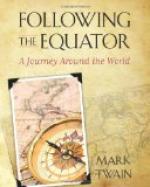In the train Mr. B. told me that the Boer jail-guards treated the black prisoners—even political ones—mercilessly. An African chief and his following had been kept there nine months without trial, and during all that time they had been without shelter from rain and sun. He said that one day the guards put a big black in the stocks for dashing his soup on the ground; they stretched his legs painfully wide apart, and set him with his back down hill; he could not endure it, and put back his hands upon the slope for a support. The guard ordered him to withdraw the support and kicked him in the back. “Then,” said Mr. B., “’the powerful black wrenched the stocks asunder and went for the guard; a Reform prisoner pulled him off, and thrashed the guard himself.”
CHAPTER LXIX.
The very ink with which all history is written is
merely fluid prejudice.
—Pudd’nhead
Wilsons’s New Calendar.
There isn’t a Parallel of Latitude but thinks
it would have been the
Equator if it had had its rights.
—Pudd’nhead
Wilson’s New Calendar.
Next to Mr. Rhodes, to me the most interesting convulsion of nature in South Africa was the diamond-crater. The Rand gold fields are a stupendous marvel, and they make all other gold fields small, but I was not a stranger to gold-mining; the veldt was a noble thing to see, but it was only another and lovelier variety of our Great Plains; the natives were very far from being uninteresting, but they were not new; and as for the towns, I could find my way without a guide through the most of them because I had learned the streets, under other names, in towns just like them in other lands; but the diamond mine was a wholly fresh thing, a splendid and absorbing novelty. Very few people in the world have seen the diamond in its home. It has but three or four homes in the world, whereas gold has a million. It is worth while to journey around the globe to see anything which can truthfully be called a novelty, and the diamond mine is the greatest and most select and restricted novelty which the globe has in stock.
The Kimberley diamond deposits were discovered about 1869, I think. When everything is taken into consideration, the wonder is that they were not discovered five thousand years ago and made familiar to the African world for the rest of time. For this reason the first diamonds were found on the surface of the ground. They were smooth and limpid, and in the sunlight they vomited fire. They were the very things which an African savage of any era would value above every other thing in the world excepting a glass bead. For two or three centuries we have been buying his lands, his cattle, his neighbor, and any other thing he had for sale, for glass beads and so it is strange that he was indifferent to the diamonds—for he must have pickets them up many and many a time.




